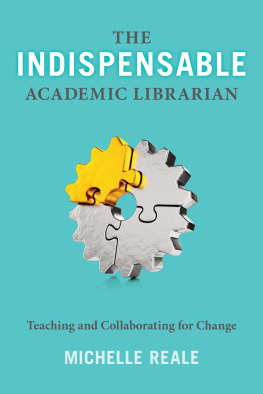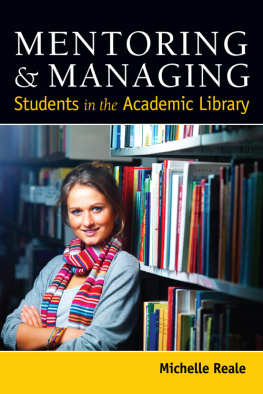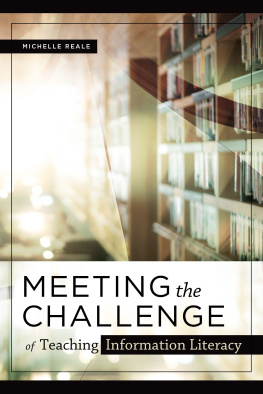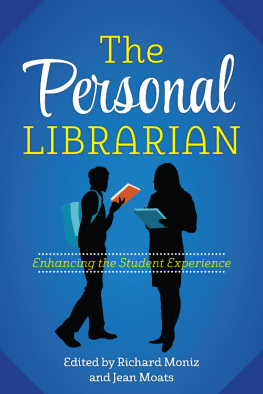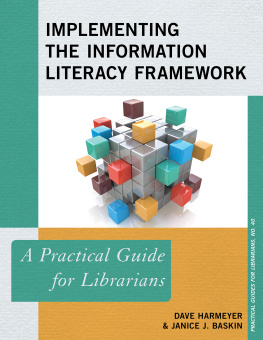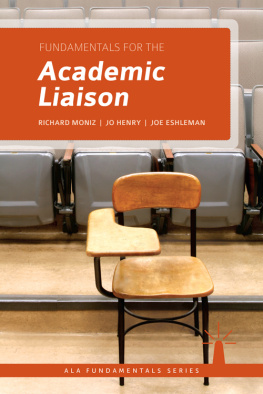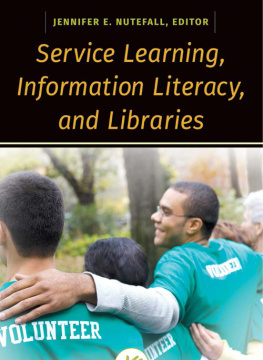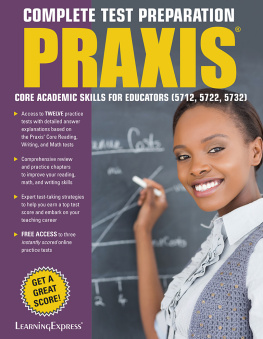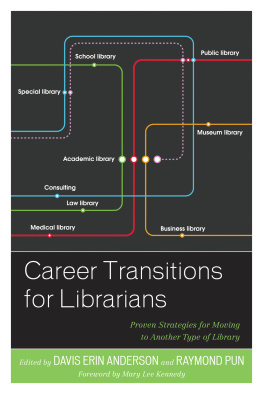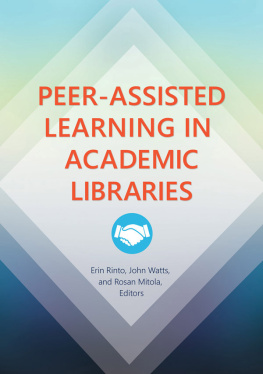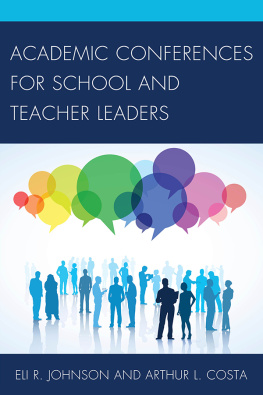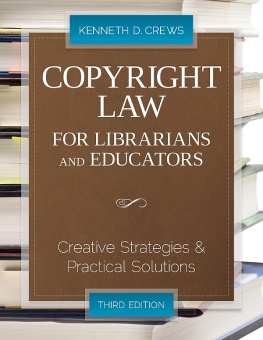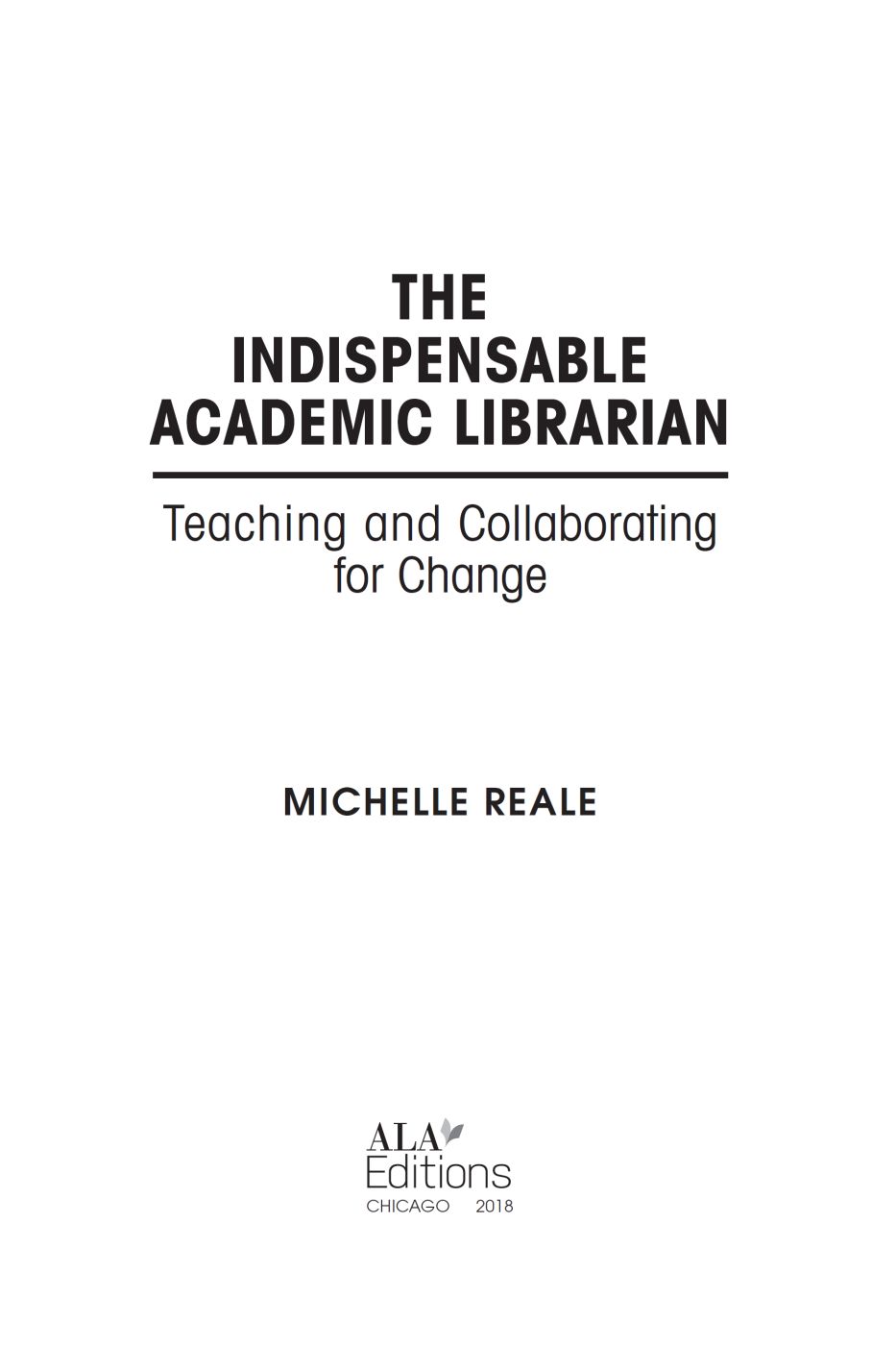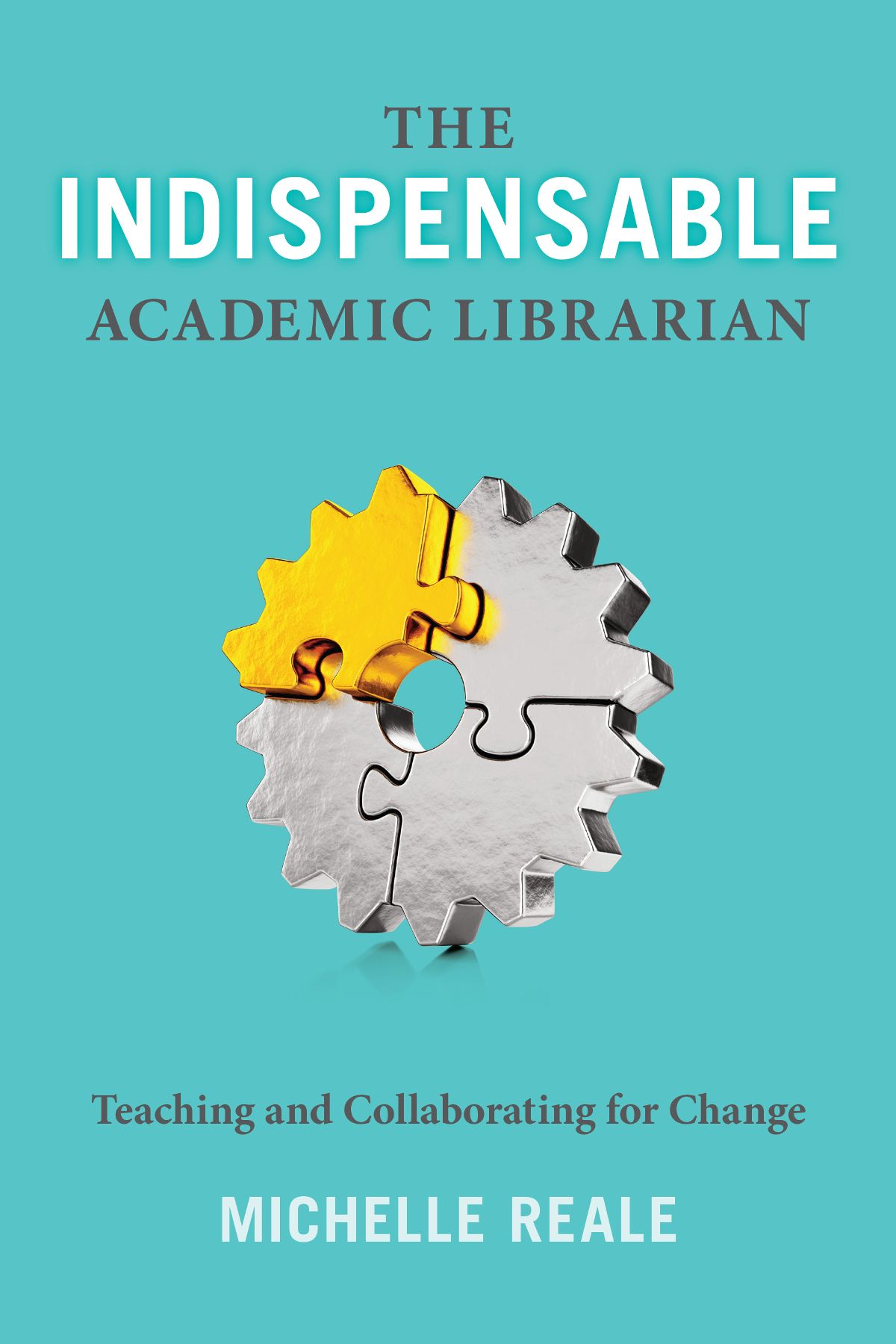
ALA Editions purchases fund advocacy, awareness, and accreditation programs for library professionals worldwide.
MICHELLE REALE an associate professor at Arcadia University near Philadelphia, Pennsylvania, is an access services and outreach librarian as well as a fully embedded librarian in two English courses. Reale holds a masters degree in English and an MFA in poetry from Arcadia University and an MSLS from Clarion University of Pennsylvania. She is also the author of Mentoring and Managing in the Academic Library (2013), Becoming an Embedded Librarian: Making Connections in the Classroom (2015), and Becoming a Reflective Librarian and Teacher: Strategies for Mindful Academic Practice (2017).
2018 by the American Library Association
Extensive effort has gone into ensuring the reliability of the information in this book; however, the publisher makes no warranty, express or implied, with respect to the material contained herein.
ISBNs:
978-0-8389-1638-4 (paper)
978-0-8389-1710-7 (PDF)
978-0-8389-1709-1 (ePub)
978-0-8389-1711-4 (Kindle)
Library of Congress Cataloging in Publication Control Number: 2018001085
Thank you to my wonderful parents who continue to lift and encourage me. Thank you to Kaylynn Hills for her friendship, encouragement, and sharp eyes. I am deeply grateful.
Contents
A Place at the Table
T he professional literature is rife with stories of the many and varied changes in our profession, which have left librarians, in theory and in practice, to limn the line between delivering what I term beck-and-call service and seeing ourselves as educators both in and out of the classroom. I have long perceived, and am by no means unique in the feeling, that academic librarians need to fully recognize ourselves not only as collaborators but also as true educators in the learning cycle of our colleges and universities.
Not surprisingly, librarians have often been thought of as teaching mere skills, an activity seen as a lower-level endeavor than that of a classroom professor who formally teaches and encourages knowledge creation. We are seen as people who merely curate knowledge structures and provide access to those structures. Some might wonder why that is such a bad thing. While I am not saying that it is untrue, this is only a part of what we do. It is a reductionist way of looking at our profession, and is wholly inaccurate as well. Every day, librarians initiate and encourage learning in both structured and unstructured areas. Not many would think of the work that librarians do across the reference desk as teaching, but that is exactly what it is. Each time a librarian comes in contact with a student, there will likely be potential for learning.
Librarians must also have intentionality when we talk about our contributions to the profession: we have our own theories, our own best practices, our own standards, and our own guidelines. Embracing these empowers us to be proactive in the educational environment and make decisions about our teaching based on what we know from our own studies and research. For instance, this knowledge and confidence enables us to tell a professor that it is a bad idea to schedule a one-shot instruction session before an assignment has even been given out, or to suggest another time to instruct a class if weve only been scheduled to fill in when a professor is at a conference or on vacation. We can provide alternatives based on our knowledge. To do this, we must assert our positions, and to do so we need to be secure in our knowledge that what we do is not an add-on, but instead a strong influence on students future interactions with librarians. Few faculty members would be willing to serve in the same educational capacity that is often required of librarians.
Promotion and tenure can be controversial issues. Although I understand their importance, I will not address these topics because others have already explored them thoroughly. My intention in this volume is to offer a philosophy of librarians as educators and to exemplify the many ways in which librarians are an integral part of teaching. Ultimately, my goal is to clarify our roles and offer ways to strengthen our teaching for students, the faculty with whom we collaborate, and, of course, ourselves.
Librarians in Academia
A Place at the Table
The time was when a library was very much like a museum and a librarian was a mouser in musty books... The time is when a library is a school, and the librarian is in the highest sense a teacher.
MELVIL DEWEY
T hose of us in the profession know that librarianship has been changing and continues to evolve rapidly, but those with whom we work and those we serve often do not. Librarianship, perhaps more than any other profession that I can think of, has constantly suffered not only from stereotypes (about which volumes have literally been written), but also from misconceptions about librarians mission, our very essence, as educators rather than mere auxiliaries to others whose mandates are perceived to be more important. In academic librarianship, these are the professors with whom we work, especially if we work at institutions where we have faculty status. There is a subtle negation of librarians as educators in the real and true sense, which may be based in the not-too-distant past when librarians were seen solely as teachers of skills that were considered necessary for research. Although skills are considered valuable on some levels, they are viewed as distinct from knowledge, perhaps because the skilled trades do not require a formal, higher education. However, although the ways we practice librarianship have changed, the manner in which others, both professors and administrators, perceive us has not. Despite my title, my scholarship, and my ubiquitous presence in the classroom and all over campus, my experiences over the years have confirmed this. I ask myself: do I wish to be more than what I am, indeed, more than what all of us are? I have considered this, particularly after a conversation about teaching with a then-colleague who told me that she didnt become a librarian to stand in front of a classroom, as our new faculty status required. At the time I sympathized with her without thinking through what she was saying. Her implication was that not only did she not want to be an educator, but that she did not think of herself as an educator, which troubled me for what I hope are obvious reasons. However, her sentiments did not make me question how I thought of myself as a faculty member or as a faculty librarian. The term faculty librarian is in and of itself confusing because it implies that librarians are not part of faculty but instead exist solely for faculty. And when librarians themselves impose limits on the profession, it only serves to reinforce how we are perceived within the academy.
I then set out on my own quest to explore some recent history and identify what our predecessors thought about our role in academia. I began making my way through old issues of the Wilson Library Bulletin, because Ive always felt that placing myself within the context of librarianship today entails learning about the profession as it was practiced twenty, thirty, forty, or more years ago. As I began to read back issues, I confirmed what I had always tacitly known, and what has been addressed in the literature from as far back as the early 1900s: that librarianship can be embattled in its perception of itself, but has always gradually and steadily grown and changed. In the past fifteen years much of this has been due to burgeoning technology (particularly the internet), but change had been brewing even before that.
Next page
